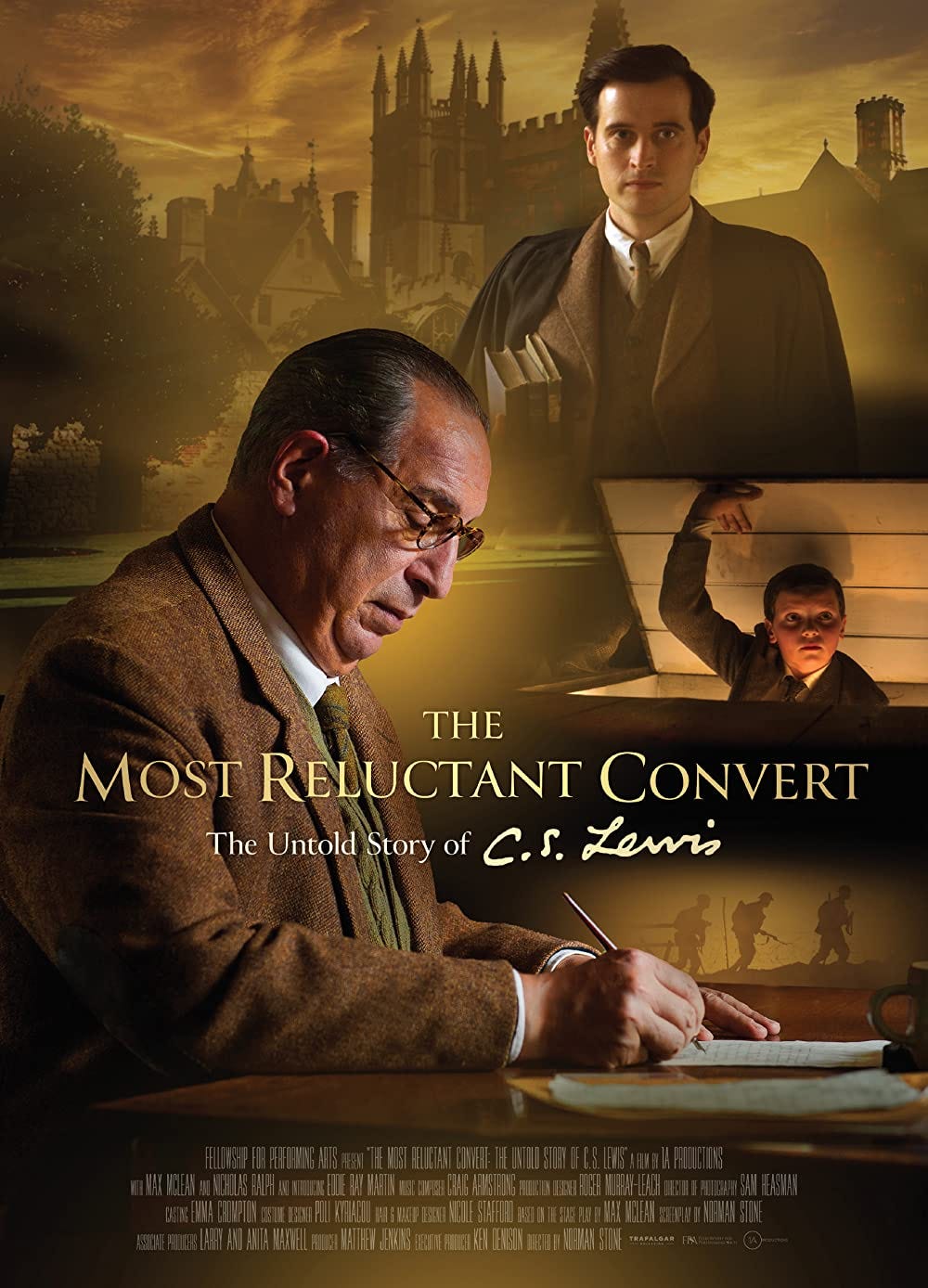Our Favorite Books and Films of 2021, Part 1
By Paul M. Gould and Melissa Cain Travis | Bulletin Roundtable
As we near the end of 2021 it is once again time to reflect on our favorite books and films (and TV shows) of the past year. We hope you’ll discover something that piques your interest as well. In this first installment, Paul M. Gould and Melissa Cain Travis share their picks.
Paul M. Gould
It’s hard to pick favorites. We always tell our kids we have no favorites. And of course, the same goes for my students (wink, wink). But favorite books or movies of the year? Hmm. That’s tough. I don’t watch as many movies as I used to. It’s not that I don’t watch things, it’s just that I’ve grown to love series where you can better develop the narrative arc of a story. So, I’m going to doubly cheat on our first question. Instead of my favorite movie of the year, I’m going to share my two favorite shows. The winners are both from Apple: Ted Lasso and For All Mankind. There isn’t much we watch together as a family these days. The boys and I all religiously watch Purdue basketball. Oddly, my wife and boys have really gotten into The Walking Dead (another favorite; as my wife constantly says, “It’s so theological”).
But over the summer and Thanksgiving holiday, when the whole family was together this year, we watched Ted Lasso. And we loved it. We laughed together. Our spirits soared—and fell—with the success and failure of Richmond AFC and its fearless coach. We loved Ted Lasso, and not just because of its humor (and we didn’t care for its crassness). For me, Lasso reminded me of three things: success, community, and hope. First, (spoiler alert) consider the devastating loss at the end of season one. Crushingly defeated, they were relegated to a lower league. In that moment of loss, Lasso gives a stirring speech about being sad together. Success isn’t just winning and losing, but whether you do things together or alone. I’m reminded of my need for others in my own journey in life. Second, and related, Ted Lasso paints a beautiful picture of the kind of community we long for. There is an ever-growing community of coaches and staff, players, friends at the local bar, and Richmond. All are connected around the common bond of their love of football (soccer) and their love of each other. And isn’t that just a beautiful picture of the church? Finally, Ted Lasso reminds me of the importance of hope. Ted is the eternal optimist. Even in the darkest of moments, he manages to see the good. Again, this is how things should be for us as Christians, who have a genuine hope because of Jesus and the resurrection.
The other show, For All Mankind, feeds my love of science fiction. The show explores an alternate history: what if Russia had beat America to the moon? How might have human history been different? How would that have changed the space race? I love this show: edgy, creative, and provocative.
My favorite book of the year? Again, this is tough. Each January, I write a blog sharing my favorite books of the year in philosophy, apologetics, fiction, and non-fiction. Stay tuned for that blog. For now, I’m going to go with William Kent Krueger’s book This Tender Land. The book’s first paragraph sold me:
In the beginning, after he labored over the heavens and the earth, the light and the dark, and land and the sea and all living things that dwell therein, after he created man and women and before he rested, I believe God gave us one final gift. Lest we forget the divine source of all that beauty, he gave us stories.[1]
In the span of a few words, Krueger gifts to us a rich theology of story: stories, like everything else, are gifts from God. He then goes on to write a wonderful tale of journey and conquest, a kind of Homer’s Odyssey meets Tom Sawyer’s Huckleberry Finn. The book itself is a gift, reminding me, once again, of the sacredness of all things and encouraging me to see the good even in the trials of life.
Notes
[1] William Kent Krueger, This Tender Land: A Novel (New York: Atria, 2019), 3.
Melissa Cain Travis
“It is a good rule, after reading a new book, never to allow yourself another new one till you have read an old one in between,” writes C. S. Lewis, in his famous essay “On Reading Old Books.” As a Great Books scholar who is passionate about intellectual history, I am keenly, painfully aware of how many important works of the Great Western Tradition I have not yet read and may not get to read in my lifetime. Thus, I tend to go well beyond Lewis’s recommendation, reading five or six old books for every new book! When our editor asked for a short piece on our favorite 2021 book and film, I had to consult my reading log to see which ones, if any, were published this year!
I’m currently reading three new books that I’m enjoying immensely and would like to mention: The Light Ages: The Surprising Story of Medieval Science by Seb Falk; Deeper Heaven: A Reader’s Guide to C. S. Lewis’s Ransom Trilogy by Christiana Hale; and Lifting the Veil: Imagination and the Kingdom of God by Malcolm Guite. I don’t yet know what will ultimately turn out to be my favorite of this entire year, but I’ve recently finished an outstanding book that I’m pleased to recommend to our Bulletin readers: From Plato to Christ: How Platonic Thought Shaped the Christian Faith, written by Dr. Louis Markos and published by IVP Academic. (I feel like I’m cheating here, since this is a 2021 book about intellectual history, ha!)
Over the past several years, I’ve spent a great deal of time studying Platonism’s role in the development of natural theology and the rise of modern science, but not much time at all on how Plato’s work influenced many other great Christian thinkers whose work has heavily shaped the faith. Part I: Plato’s Pre-Christian Vision examines Plato’s philosophical heritage and then the Platonic dialogues that are key to Markos’s central thesis. After this groundwork, Part II: Plato’s Christian Legacy traces Plato’s influence through the writings of some of the prominent Church Fathers and then through several major theologians, philosophers, poets, and finally, C. S. Lewis. Markos’s book is an accessible, winsome, and concise resource that helped diminish some significant gaps in my knowledge, improved my ability to articulate what exactly we mean when we say that Platonism influenced Christian thought (crucial, since many Christians jump to wrong conclusions), and to explain the importance of the pagan classics in Christian education.
As for my favorite film of 2021, that’s rather easy: The Most Reluctant Convert: The Untold Story of C. S. Lewis is the clear winner. I have followed the marvelous work of Fellowship for the Performing Arts for about a decade. My first experience was a 2012 stage production of The Screwtape Letters, starring Max McLean as Screwtape. Since then, I’ve had the great pleasure of seeing FPA’s production of The Great Divorce and, more recently, The Most Reluctant Convert—starring McClean as C. S. Lewis. The play uses dramatic monologue meticulously excised from Surprised by Joy to tell the story of Lewis’s conversion. When I heard that the script was being adapted to film by director and producer Norman Stone, I wondered how it would be handled. When teasers first began trickling out, it sounded like the film would be a well-done biopic with McLean in the role of the late-middle-aged Lewis.
It turned out to be something quite different: an artful blend of biographical dramatization and monologue, with the eldest version of Lewis serving as the third-person omniscient raconteur while going about his life at Oxford and the Kilns—having a pint at the local pub, walking around Magdalen College, eating his breakfast, making a cup of tea. The cinematography is stunning, and the acting is excellent; it wasn’t at all difficult to suspend belief and see Lewis, not McLean, on the big screen. As a lover of Lewis, I was engrossed from the beginning and the experience of “seeing” and “hearing” Lewis was, in a word, magical.
There were many fun Easter eggs to delight devoted Lewis fans, and it was especially fun for me to see Dr. Michael Ward, who was my colleague when I was on the faculty at HBU, play the role of the parish vicar. If you’ve never heard of Dr. Ward, he is the world’s top living Lewis scholar; he’s the author of After Humanity, Planet Narnia, and the abridged version of the latter, The Narnia Code (which has been adapted as a documentary by Norman Stone).
What was supposed to be a one-night event (grossing $1.2 million, coming in second only to Dune and beating out James Bond at the box office that evening) was extended for another couple of weeks. The film has vastly exceeded expectations, which I hope means big things to come for FPA. I believe the grand success of The Most Reluctant Convert is a hint to a longing in many hearts during this fraught time in our culture. We are desperate for goodness, truth, beauty, and hope. I cannot recommend the film enough, and I look forward to being able to purchase a copy for repeated viewing and use in the classroom.
Header image by Dariusz Sankowski from Pixabay
Give Yourself—or a Friend—the Gift of Knowledge!
Would you like to grow in your knowledge of the Christian worldview and your ability to defend it? Subscribe to The Worldview Bulletin for only $2.50 per month and learn from world-class Christian scholars and apologists. You’ll receive our free weekly email as well as our subscriber-only monthly newsletter.
Or, to give a gift subscription that a friend or family member will benefit from the whole year, visit here.
Be equipped, informed, and encouraged!
“The Worldview Bulletin is a must-have resource for everyone who’s committed to spreading and defending the faith. It’s timely, always relevant, frequently eye-opening, and it never fails to encourage, inspire, and equip.”
— Lee Strobel, New York Times bestselling author of more than forty books and founding director of the Lee Strobel Center for Evangelism and Applied Apologetics
“The Worldview Bulletin is a wonderful resource for the church. It’s timely and helpful.” — Sean McDowell, associate professor in the Christian Apologetics program at Talbot School of Theology and author of The Fate of the Apostles: Examining the Martyrdom Accounts of the Closest Followers of Jesus (Routledge).





